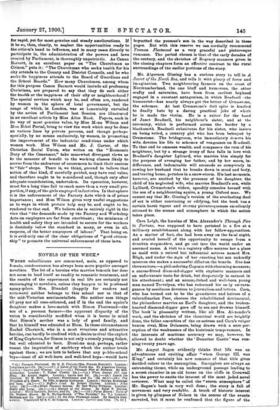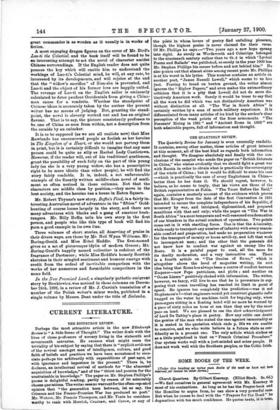NOVELS OF THE WEEK.*
WHERE misalliances are concerned, male, as opposed to female, condescension has always been more popular amongst novelists. The lot of a heroine who marries beneath her does not seem to lend itself so readily to romantic treatment, and the results of the experiment in real life are certainly not encouraging to novelists, unless they happen to be professed agony-pilers. Mrs. Blundell (happily for readers and reviewers) neither belongs to this school nor to that of the mid-Victorian sentimentalists. She neither sees things all grey nor all rose-coloured, and if in the end the squire's daughter makes a love-match with Simon Fleetwood—the son of a yeoman farmer—the apparent disparity of the union is considerably modified when it is borne in mind that Simon's mother was a lady of good family, and that he himself was educated at Eton. In these circumstances Rachel Charnock, who is a most vivacious and attractive heroine, can hardly be credited with a desire to rival the exploit of King Cophetua, for Simon is not only a comely young fellow, but well educated to boot. Etonians may, perhaps, rather resent the imputation of snobbery which the author levels against them ; we are loth to believe that any public-school boys—least of all well-born and well-bred boys—would have • (1.) Yeoman Fleetwood. By M. E. Francis (Mrs. Francis Blundell). London : Longman and Co. [6a]—(2.) A Secret of the North Sea. By Algernon Gissing. London : Chatto and Wlndus. (63.]—(3.) Through Fire to Ptortune. BS Mrs. Alexander. London : T. Fisher Enwln. (6.9.)--(4.) When George II!. was Zing. By Amyot Sagon. London : Sands and Co. 168.]—(5.) Lao•tt the Celestial. By M. Bird. London : Hutchinson and Co. [3s. 6d.)—(6.) The Kingdom of a Heart. By Effie Adelaide Rowlands. Loudon : George Routiedge and Sons. [6s.]—(7.) Boffin's Pend. By Robert Throne. London : John Lone. var.)—(so Greek Peasant Stories. By Neil Wynn Williams. London : Digby and Long. [68.)—(9.) Marget of the Manse. By Ethel F. Meddle. London : Wells Gardner, Dayton, and Co. [66.)—(10.) Purse Bloom: Tales of the Western Moors. By S. Baring-Gould. ("The Novelist," No. V.) London : Methuen and co. [sd..)—(11.) In the New Promised Land. By Henryk Slen- kiewlcz. Translated by S. C. de Soissons. London : Jarrokl and Sons. [21. ed.] boycotted the yeoman's son in the way described in these pages. But with this reserve we can cordially recommend Yeoman Fleetwood as a very graceful and picturesque romance. The period chosen is that of the early decades of the century, and the sketches of Regency manners given in the closing chapters form an effective contrast to the rural surroundings of the earlier portions of the story.
Mr. Algernon Gissing has a curious story to tell in A Secret of the Y ortli Sea, and tells it with plenty of force and imagination. Two neighbouring farmers on the coast of Northumberland, the one bluff and humorous, the other crafty and saturnine, have been from earliest boyhood engaged in a constant antagonism, in which Beadoell -the humonrist—has nearly always got the better of Uruwstone, the schemer. At last Crumstone'e dull spite is kindled to deadly hate by a daring practical joke of which he is made the victim. He is a suitor for the hand of Janet Beadnell, his neighbour's sister, and at the ceremony, which is performed across the border by a blacksmith, Beadnell substitutes for his sister, who insists on being veiled, a country girl who has been betrayed by Orumstone. The bridegroom, w ho immediately deserts his wife, devotes his life to schemes of vengeance on Beadnell. To that end he amasses wealth, and compasses the ruin of his neighbour, but by a strange irony of fate falls in love with Beadnell's daughter Lylliard, who marries him simply for the purpose of avenging her father, and by her scorn, in- difference, and indomitable will succeeds so completely in cowing her husband that be breaks down in mind and body, and leaving home, perishes in a snow-storm. His last moments, however, are soothed by the presence of his daughter, the child of his neglected wife, who marries Beadnell's son, while Lylliard, Crumstone's widow, speedily consoles herself with the son of a neighbouring squire, a young Oxford man. We cannot say that Mr. Giseing's version of the everlasting duel of sex is either convincing or edifying, but the book has a certain harsh vigour and stormy picturesqueness excellently attuned to the scenes and atmosphere in which the action takes place.
Cara Leigh, the baroine of Mrs. Alexander's Through Fire to Fortune, was supposed to have perished in a fire at a millinery establishment along with her fellow-apprentices. As a matter of fact, she had been away on the fatal night, and availed herself of the opportunity to escape from a drunken stepmother, and go out into the world under an assumed name. A visit to a registry office secures her a place as maid with a retired but influential actress named Mrs. Bligh, and under the w4is of her exacting but not unkindly mistress she makes a successful debut on the boards. She has three suitors,—a philandering Captain with charming manners; a coarse-fibred diamond-digger with explosive manners and an unfortunate taste for drink, but desperately in earnest in his attachment; and an accomplished and well-born young man named Trevelyan, who has redeemed his early extrava- gances by assiduous devotion to journalism and letters. Cara, who has turned out to be the grandniece and heiress of a valetudinarian Peer, chooses the rehabilitated detrimental, the philanderer marries an Earl's daughter, and the broken- hearted diamond-digger goes off to sea and drowns himself. The book 'is pleasantly written, like all Mrs. Alexander's work, and the sketches of the theatrical world are brightly done, the feline amenities of the ex-actress and Cara's vulgar buxom rival, Miss Delamere, being drawn with a sure per- ception of the weaknesses of the histrionic temperament. In the interests of maritime accuracy we may, however, be allowed to doubt whether the Danottar Castle' was run- ning twenty years ago.
Mr. Amyot Sagon evidently thinks that life was an adventurous and exciting affair "when George IIL was King," and certainly his new romance of that title gives decided colour to the assumption. Smugglers are always an entrancing theme, while an underground passage leading to a, secret chamber in an old house on the cliffs in Cornwall has the power to excite the interest of the most jaded novel reviewer. What may be called the "storm atmosphere" of Mr. Sagon's book is very well done; the story is frill of movement and very readable. A touch of historic interest is given by glimpses of Nelson in the course of the events narrated, but it must be confessed that the figure of the
great commander is as wooden as it usually is in works of fiction.
A most engaging dragon figures on the cover of Mr. Bird's Lao.ti the Celestial. and the book itself will be found to be an interesting attempt to set the novel of character amidst Chinese surroundings. If the English reader does not quite possess the key which will enable him to understand the workings of Lao-ti's Celestial mind, he will, at any rate, be interested by its developments, and will rejoice at the end that the " widow's sacrifice" of Sien-sha is prevented, and Lao-ti and the object of his former love are happily united. The revenge of Lao-ti on the English sailor is eminently calculated to deter prudent Occidentals from giving a China- man cause for a vendetta. Whether the standpoint of Chinese ideas is accurately taken by the author the present writer has no means of judging. But, granting the stand- point, the novel is cleverly worked out and has an original flavour. That is to say, the picture consistently professes to be one of China as seen from within, not a description from the outside by an onlooker.
It is to be supposed (as we are all realists now) that Miss Rowlands has encountered people as foolish as her heroine in The Kingdom of a Heart, or she would not portray them in print, but it is certainly difficult to imagine that any sane person could be quite as silly as Rachel Lady Castletown. However, if the reader will, out of his traditional gentleness, grant the possibility of such folly on the part of this young lady (as she is a very young widow, she has a prescriptive right to be more idiotic than other people), he will find the story fairly readable. It is, indeed, a not unfavourable example of the fluently written middle-class novel of senti- ment so often noticed in these columns. Not that the characters are middle class by position,—they move in the best society, and the heroine has a house in Eaton Square.
Mr. Robert Thynne's new story, Boffin's Find, is a fairly in. teresting Australian novel of adventure in the "fifties." Gold- hunting of course looms largely in the story, and there are many adventures with blacks and a gang of amateur bush- rangers. Mr. Billy Boffin tells his own story in the first person, and people who like this type of book will find his yarn a good example in its own line.
Three volumes of short stories, all deserving of praise in their divers ways, are those by Mr. Neil Wynn Williams, Mr . Baring-Gould. and Miss Ethel Heddle. The first-named gives us a set of picturesque idylls of modern Greece; Mr. Baring-Gould's happily named collection is redolent of the fragrance of Dartmoor ; while Miss Heddle's homely Scottish sketches in their mingled sentiment and humour emerge with credit from the ordeal of inevitable comparison with the works of her numerous and formidable competitors in the same field.
In the New Promised Land, a singularly pathetic emigrant story by Sienkiewicz, was noticed in these columns on Decem- ber 24th. 1898, in a review of Mr. J. Curtin's translation of a number of the Polish writer's minor works, published in a single volume by Messrs. Dent under the title of Sielanka.



















































 Previous page
Previous page